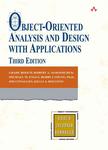版权所有:内蒙古大学图书馆 技术提供:维普资讯• 智图
内蒙古自治区呼和浩特市赛罕区大学西街235号 邮编: 010021

丛 书 名:The Addison-Wesley object technology series
版本说明:3rd ed
I S B N:(纸本) 9780201895513
出 版 社:Addison-Wesley
出 版 年:2007年
主 题 词:Object Oriented Programming
摘 要:*** this eagerly awaited second edition, Grady Booch draws upon the rich and varied results of those projects and offers improved methods for object development and a new, unified notation. With numerous examples implemented in C++, Booch illustrates essential concepts, explains the method, and shows successful applications in a variety of fields. Booch also gives pragmatic advice on a host of issues, including classification, implementation strategies, and cost-effective project management. A two-time winner of Software Development s coveted Jolt Cola Product Excellence Award! --This text refers to the Hardcover *** DescriptionObject-Oriented Design with Applications has long been the essential reference to object-oriented technology, which, in turn, has evolved to join the mainstream of industrial-strength software development. In this third edition--the first revision in 13 years--readers can learn to apply object-oriented methods using new paradigms such as Java, the Unified Modeling Language (UML) 2.0, and .*** authors draw upon their rich and varied experience to offer improved methods for object development and numerous examples that tackle the complex problems faced by software engineers, including systems architecture, data acquisition, cryptoanalysis, control systems, and Web development. They illustrate essential concepts, explain the method, and show successful applications in a variety of fields. You ll also find pragmatic advice on a host of issues, including classification, implementation strategies, and cost-effective project *** to this new edition are* An introduction to the new UML 2.0, from the notation s most fundamental and advanced elements with an emphasis on key changes* New domains and contexts* A greatly enhanced focus on modeling--as eagerly requested by readers--with five chapters that each delve into one phase of the overall development lifecycle.* Fresh approaches to reasoning about complex systems* An